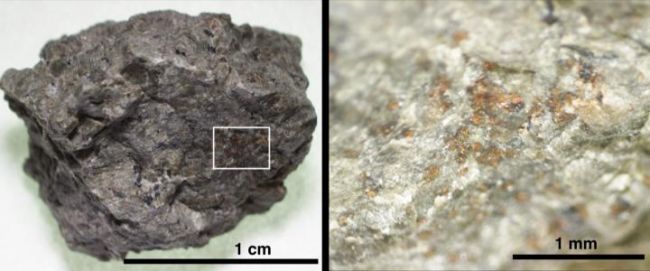And the organics contain nitrogen, another ingredient necessary for life as we know it.
Source: Space.com
Ancient Mars is looking better and better as an abode for life.
The famed Mars meteorite Allan Hills 84001 (ALH84001) contains 4-billion-year-old native organic molecules, the carbon-containing building blocks of life as we know it, a new study suggests.
And that’s not all. The organics contain nitrogen, another ingredient that Earth life depends on, and were found within carbonate minerals, which usually form in groundwater. So the discovery adds to an emerging picture of a wet and potentially habitable Mars in the distant past, study team members said.
This picture has been fleshed out by a range of observations over the years, including recent work by NASA’s Mars rover Curiosity. Curiosity has spotted ancient native organics as well, and the car-size robot found evidence of a long-ago, but long-lived, lake-and-stream system at its study site, the Red Planet’s 96-mile-wide (154 kilometers) Gale Crater. (Mars is very different today, of course; the planet transitioned to a cold and dry world about 3.5 billion years ago, after it lost most of its atmosphere to space.)
Scientists think ALH84001 was blasted off Mars by a powerful impact 16 million years ago and came down to Earth much later, about 13,000 years ago.
The meteorite, which was discovered in Antarctica in 1984, has been in the spotlight before. In 1996, a research team led by David McKay of NASA’s Johnson Space Center claimed to have found compelling evidence of ancient microbial Mars life in ALH84001. The scientists cited four main lines of evidence, one of which involved carbonate globules and organic molecules.
The scientific community has generally deemed this collection of evidence to be unconvincing, stressing that abiotic factors could explain the observations. But the study authors stand by their original conclusions, and debate over ALH84001 continues to this day.
In the new study, researchers led by Mizuho Koike, of the Institute of Space and Astronautical Science at the Japan Aerospace Exploration Agency, looked at the Mars rock in a new way. The team used novel and highly precise analytical techniques, including a type of X-ray spectroscopy, to detect nitrogen in ALH84001 and trace it to the carbonate minerals.
This was a first; nobody had found nitrogen-containing organics in the rock before, team members said. The researchers think the organics were trapped in the carbonate about 4 billion years ago; they said their techniques minimized the chance of terrestrial contamination, which is always a concern with Mars meteorites.
To be clear: The organics are not evidence of Mars life; such compounds can be produced abiotically as well as biotically. And there are other important questions about the ALH84001 organics as well, such as where they formed.
“There are two main possibilities: either they came from outside Mars, or they formed on Mars,” study co-author Atsuko Kobayashi, of the Earth-Life Science Institute at the Tokyo Institute of Technology, said in a statement.
“Early in the solar system’s history, Mars was likely showered with significant amounts of organic matter, for example from carbon-rich meteorites, comets and dust particles,” Kobayashi added. “Some of them may have dissolved in the [Martian] brine and been trapped inside the carbonates.”
Scientists have a chance to make some real progress on the Mars-life question soon. NASA’s Mars 2020 rover Perseverance, which is scheduled to launch in July, will hunt for signs of ancient Red Planet organisms and collect samples for future return to Earth. Once this pristine Mars material lands here — which could happen as soon as 2031 — researchers around the world will be able to scrutinize it in great detail.
The new study was published online April 24 in the journal Nature Communications.
Source: Space.com

































Leave a Comment
You must be logged in to post a comment.